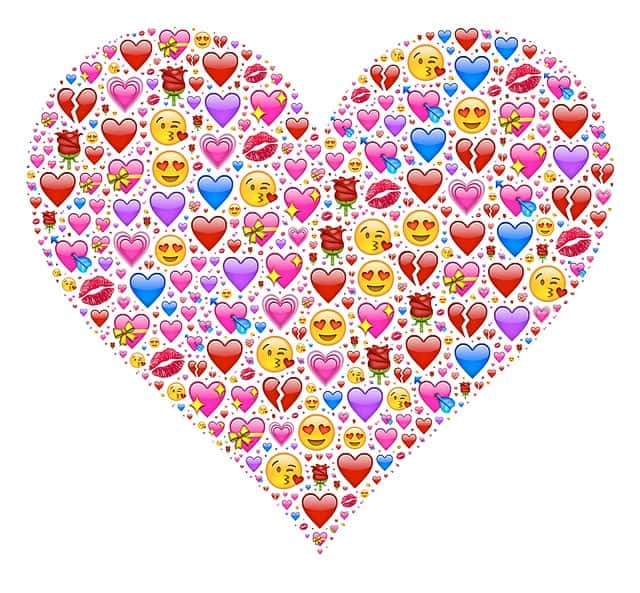Decoding The Heart: What Do Heart Emoji Colors Mean?
In the digital age, emojis have become an essential part of our communication, helping to convey emotions and sentiments that words sometimes fail to capture. Among the myriad of emojis, heart emojis rank high in popularity, often used to express love, affection, and friendship. However, did you ever stop to wonder what do heart emoji colors mean? Each color carries its own unique significance, and understanding these meanings can enhance your communication and help you express your feelings more accurately.
The heart emoji has evolved into a universal symbol that transcends language barriers, allowing people to connect on a deeper emotional level. Whether you're sending a message of love to a partner, a friendly gesture to a friend, or even a sympathetic nod to someone in need, the color of the heart emoji you choose can change the tone and intention behind your message. So, let's dive into the fascinating world of heart emoji colors and decode their meanings!
In this article, we will explore the various heart emoji colors, their meanings, and how they can impact your conversations. By the end, you'll be well-equipped to choose the right heart emoji that resonates with your emotions and intentions. So, what do heart emoji colors mean? Let's find out together!
What Do Heart Emoji Colors Mean?
Understanding the meanings behind different heart emoji colors can be essential in digital communication. Here are the most commonly used heart emojis and their meanings:
- ❤️ Red Heart: Represents love, passion, and deep affection.
- 🧡 Orange Heart: Symbolizes warmth, friendship, and care.
- 💛 Yellow Heart: Represents happiness, positivity, and friendship.
- 💚 Green Heart: Symbolizes growth, harmony, and environmental consciousness.
- 💙 Blue Heart: Represents trust, loyalty, and peace.
- 💜 Purple Heart: Symbolizes compassion, understanding, and emotional support.
- 🤍 White Heart: Represents purity, innocence, and a sense of peace.
- 🖤 Black Heart: Often used to convey dark humor, sadness, or a sense of loss.
Why Are There Different Heart Emoji Colors?
The introduction of various heart emoji colors allows for more nuanced expressions of emotions. Each color can represent different feelings or relationships.
What Does the Red Heart Emoji Represent?
The red heart emoji is perhaps the most recognized and widely used heart emoji. It represents love, deep affection, and romantic feelings. This emoji is often used in messages between partners, signifying passion and emotional connection.
What Does the Orange Heart Emoji Symbolize?
While the red heart is more about romance, the orange heart emoji signifies warmth and friendship. It can be used to express care and compassion towards friends or loved ones without the romantic undertone of the red heart.
What Do Heart Emoji Colors Mean in Relationships?
The color of the heart emoji can play a significant role in how relationships are perceived and understood. Each color can convey different stages or types of relationships.
How Does the Yellow Heart Emoji Reflect Friendship?
The yellow heart emoji is often associated with happiness and positivity. It can be used to express friendship and is perfect for light-hearted conversations. Sending a yellow heart can indicate that you value a friendship without any romantic implications.
What Does the Green Heart Emoji Mean?
The green heart is versatile; it can symbolize growth and harmony, making it suitable for expressing support for environmental causes or personal growth. In relationships, it can also signify a healthy and balanced connection.
How Do Heart Emoji Colors Impact Communication?
The color of the heart emoji you choose can significantly influence how your message is received. Understanding the meanings can help you avoid miscommunication.
What Is the Meaning Behind the Blue Heart Emoji?
The blue heart emoji represents trust, loyalty, and peace. It can be used in platonic relationships to signify deep trust and emotional support. However, it can also be romantic if used in the right context.
What About the Purple Heart Emoji?
The purple heart emoji is often associated with compassion and understanding. It can be used to show empathy towards someone who is going through a tough time or to represent a caring relationship.
What Do Heart Emoji Colors Mean in Casual Conversations?
In casual conversations, the choice of heart emoji can add a playful tone or provide emotional depth to your message.
What Does the White Heart Emoji Convey?
The white heart emoji signifies purity and innocence. It can be used in conversations that are light-hearted or to convey a sense of peace and calmness in a relationship.
What Is the Significance of the Black Heart Emoji?
The black heart emoji often carries a more complex meaning. It can represent sadness, grief, or even dark humor. Knowing when to use it is essential, as it can drastically change the message you are trying to convey.
Conclusion: What Do Heart Emoji Colors Mean?
Understanding what do heart emoji colors mean can enhance your digital communication, allowing you to express your feelings more accurately. Each color carries its own unique significance, from romantic love to deep friendship and compassion. By carefully selecting the heart emoji that aligns with your emotions, you can convey your sentiments effectively and avoid any potential misunderstandings.
So next time you send a heart emoji, think about the color you choose and the message you want to convey. Whether it's a red heart for love or a blue heart for friendship, the right emoji can make all the difference in how your message is received!
Article Recommendations
- Juulclassactioncom Legit
- Rodney Alcala On Dating Game Video
- Short Positive Quotes About Life Challenges


